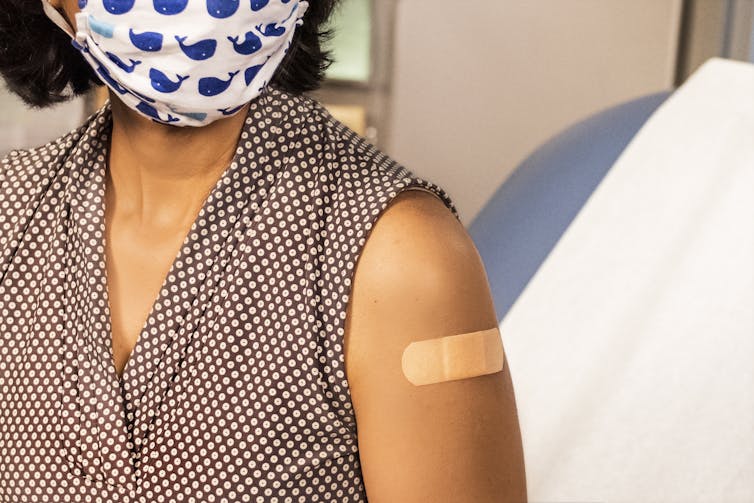What's the Delta COVID variant found in Melbourne? Is it more infectious and does it spread more in kids? A virologist explains
- Written by Kirsty Short, Senior Lecturer, The University of Queensland
Victoria’s current COVID outbreak took another turn last week when a new variant was discovered by health authorities. It’s not clear whether this new “Delta” variant emerged from Victoria, New South Wales or elsewhere, and it hasn’t yet been matched to any cases in hotel quarantine.
We’ve still got a lot to learn about this variant, and most data we have right now is coming out of the UK. We don’t know yet for sure whether the variant is deadlier or whether it spreads more in kids.
But early data suggests it’s more transmissible than other variants.
The good news is that both the AstraZeneca and Pfizer vaccines still work relatively well against it — though only after the second dose.
What’s the Delta variant?
The World Health Organisation has a new naming system, using the Greek alphabet, for coronavirus variants of concern.
The Delta variant was previously known as the “Indian variant”, as it was first found in India. It’s one of three sub-lineages of the Indian variant, and is also known as B.1.617.2. The Kappa variant — the strain most prevalent in Victoria’s latest outbreak and which originated from South Australian hotel quarantine — is B.1.617.1.
Read more: What's the difference between mutations, variants and strains? A guide to COVID terminology
The WHO has introduced this new naming system to avoid stigma associated with attaching country names to variants. There was concern the old naming system might decrease the likelihood of countries reporting new variants in future, for fear their country would be blamed for the variant.
One historical example is the “Spanish flu”. In fact, evidence suggests this flu strain probably didn’t originate in Spain.
The new system is a non-judgemental way to keep track of new variants.
 The Delta variant has been linked to an outbreak at North Melbourne Primary School.
James Ross/AAP
The Delta variant has been linked to an outbreak at North Melbourne Primary School.
James Ross/AAP
It’s more infectious
The Delta variant has been detected in many different countries across the world, including the UK, US, Fiji, Singapore and now Australia.
In the UK, Delta is outcompeting the Alpha strain, formerly known as the “UK variant”. This alone suggests Delta is more transmissible than Alpha, which is significantly more transmissible than the original strain first detected in Wuhan, China.
The UK’s health secretary said Delta is 40% more infectious than Alpha, and Doherty Institute director Sharon Lewin estimated it’s about 50% more infectious than Alpha.
People infected with Delta tend to infect more of their household members than people with the Alpha strain.
We don’t know yet exactly why it’s more transmissible, but data suggests it’s better at replicating in our cells than other variants. In virology, viruses which are better at replicating in cells tend to be more infectious.
Does it have a shorter incubation period?
Probably not.
Public Health England looked at the time it took an index case with the Delta variant to infect someone in their household.
It found the time between the exposure date and the household member becoming symptomatic was four days, which isn’t significantly different to the Alpha variant.
We don’t know if it’s deadlier yet
There’s some evidence Delta is associated with a higher risk of hospitalisation compared to Alpha.
However, we can’t say this with absolute certainty because it’s very early days.
There’s selective pressure on a virus to become more transmissible, because a virus wants to replicate as much as possible.
But there’s not the same selective pressure on viruses to become more lethal, and it’s not in the virus’ interest to kill its host. The ultimate successful virus lives in its host indefinitely.
I was quite surprised to see suggestions that some SARS-CoV-2 variants are potentially deadlier, though factors that make them more infectious might also make them more lethal.
There are also lots of examples of viruses that become more lethal but at the cost of reduced infectiousness.
One example is bird flu. Because this virus targets the lower respiratory tract, it’s quite deadly because that’s the site where oxygen transfer takes place. However, this makes it harder to transmit.
Are there more cases in kids?
It’s hard to answer this question with certainty.
Victoria’s Chief Health Officer Brett Sutton said there are anecdotal reports of Delta being more transmissible in kids.
This same hypothesis was floated when the Alpha variant was first becoming dominant in some parts of the world.
 Early data suggests two doses of AstraZeneca is 60% effective, and Pfizer 88%, against the Delta variant.
CDC/Unsplash
Early data suggests two doses of AstraZeneca is 60% effective, and Pfizer 88%, against the Delta variant.
CDC/Unsplash
My laboratory has recently investigated whether Alpha replicates better in the cells of children and found it did not.
We haven’t been able to test the Delta variant in our lab yet, but I’d treat this idea with caution, for two reasons.
The first is that the strain is likely more infectious in general, which could be leading to more cases in kids (and everyone).
And secondly, kids haven’t been vaccinated, whereas many adults have, which biases the data.
Our vaccines still work well against it
Some data suggest Delta has the ability to evade our immune systems. This is assessed by looking at the number of antibodies in vaccinated people, then seeing how well those antibodies neutralise the virus in the lab.
Indeed there is a drop off in antibody protection with this variant. However, the key thing to note is that a drop in antibodies in lab tests doesn’t necessarily severely hinder vaccines. Lab results should be treated with caution.
The good news is our current crop of COVID vaccines still remain relatively effective against Delta in the real world.
Data from Public Health England found one dose of AstraZeneca or Pfizer was 33% effective against the strain, but two doses was 60% (AstraZeneca) and 88% (Pfizer) effective.
What this shows is we can’t rely on the first dose alone. Everyone really needs to make sure they have their second dose.
Authors: Kirsty Short, Senior Lecturer, The University of Queensland




